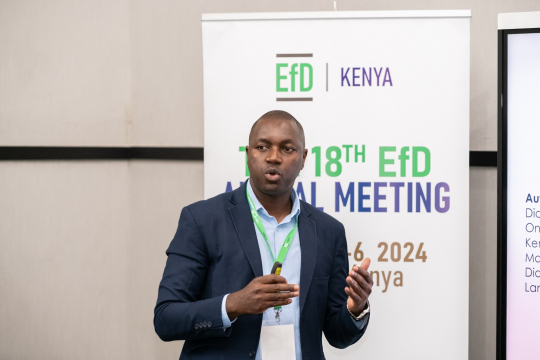Kenneth Kigundu describes the Inclusive Green Economy in Practice (IGE) program as a cornerstone of long-term capacity building. By 2027, the program will have 35 well-trained civil servants in each of the five participating countries, as potential trainers and change agents within their organization. “This kind of multiplier effect is exactly what our public sector needs,” he stated, while underlining that the program also benefits the research community.
EfD Kenya research fellow Kenneth Kigundu joined the IGE program in September 2023, stepping into a dynamic initiative already underway. At the time, he served as an assistant to a colleague who had the role of Policy Engagement Specialist (PES). The PES works closely together with the program’s participants (IGE Fellows) at ministries and agencies and plays an important coordinating role. The PES is part of each country’s support team, which leads the local implementation of the IGE program. Later, the colleague transitioned to other assignments, and Kenneth took over the PES role.
Bridging policy and research
Coming into the program as a PES and a researcher, he quickly saw the value of IGE’s policy-research interface. “Researchers are often seen as working in silos,” he reflects. “But the IGE program creates direct connections with policymakers, giving deeper insight into their challenges and helping ensure that research responds to real-world policy needs.”
The IGE program lays the foundation for deeper collaboration between researchers and policymakers across the EfD network. EfD centers now have access to trained and motivated policy actors, making it much easier to co-create research ideas.
“With this capacity in place, EfD’s collaborative model becomes far more feasible and impactful”, Kenneth noted.
Further, the program’s emphasis on social inclusion was a concept he admits hadn’t featured that much in his earlier research.
“Now, I can’t ignore it. Policy must consider all affected groups, positively or negatively.”
This awareness has also shaped Kenneth Kigundu’s approach in his leadership of Kenya’s transformative initiatives (TI) process.
The transformative initiative is an idea co-created by civil servants and the IGE support team to address a pressing societal challenge in green, inclusive, and poverty-reducing ways.
Driving change through transformative initiatives
Building on his policy experience, Kenneth has led two TI processes in Kenya under the IGE program. The first, in 2023, addressed Kenya’s heavy reliance on biomass for cooking, used by about 68% of households, and explored why cleaner alternatives are not used despite being available.
The 2024 TI focused on accelerating Kenya’s uptake of electric vehicles (EVs), a key sector for reducing carbon emissions. With only around 3,300 EVs registered nationally, the initiative assessed policy readiness, infrastructure, supply chains, grid capacity, and public perceptions.
For a TI to translate into real policy, he emphasized the importance of strong buy-in from IGE organizations: “Early and sustained engagement from ministries and agencies where our fellows work makes a real difference. That’s what we encourage our fellows to ensure.”
2025 fellows to deliver on Climate-Smart Agriculture
The 2025 IGE cohort is off to a promising start, with strong engagement and collaboration. Expectations are high that their TI will generate meaningful, policy-relevant outcomes in climate-smart agriculture, a critical area given the country’s food security challenge.
The fellows are drawn from key ministries including the State Department for Livestock Development, the State Department of Agriculture, the Ministry of Devolution, the National Treasury, and the Climate Change Directorate.
“The need for capacity in the Global South remains immense and programs like IGE offer a path forward, built on trust, relevance, and local ownership,” says Kenneth Kigundu.
Responsibilities of a PES
The PES role involves coordinating national IGE activities, connecting the global IGE team with local civil servants (whom we call IGE fellows), and working closely with the national IGE Lead. Other responsibilities are organizing monthly planning meetings, developing work plans and budgets, supporting the transformative initiative (TI) process, facilitating training and workshops, and linking different IGE fellow cohorts through the alumni platform, IGEP Forum.
By: Jane Maina
